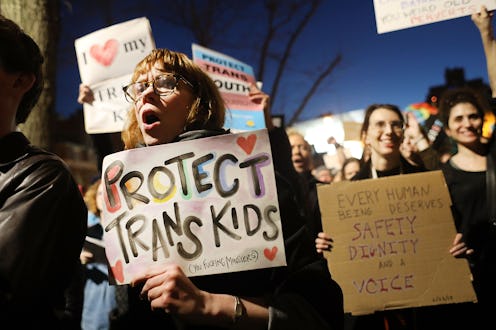Life
Calling Transgender Kids By Their Name Reduces Symptoms Of Depression, According To A New Study

For many people who are transgender, an important step in their transition is picking a name that reflects and affirms their gender identity. Though it's commonly understood that calling a trans person by their birth name (sometimes called "dead-naming") is disrespectful and transphobic, a new study is showing just how important calling a trans person by their correct name truly is: According to new research, using the "chosen names" of transgender teens and young adults dramatically reduces symptoms of depression, and boosts their mental health overall.
The study, conducted at the University of Texas (UT) at Austin, was published in the Journal of Adolescent Health (JAH) ahead of the International Transgender Day of Visibility, which was on Mar. 31. Researchers interviewed 129 transgender people between the ages of 15 to 21, from diverse, socioeconomic backgrounds, on their freedom to use their chosen name in different contexts. (The study authors utilized the phrase "chosen name" to distinguish from birth name, but it's important to note that, as with pronouns, the name a trans person use is simply their name — no modifier needed.) Unsurprisingly, the study found a large correlation between using a transgender adolescent's chosen name, and their mental well being.
"Many kids who are transgender have chosen a name that is different than the one that they were given at birth. We showed that the more contexts or settings where they were able to use their [...] name, the stronger their mental health was," Dr. Stephen T. Russell, the author of the study and Department Chair for human development and family science at UT at Austin, said in the press release.
In fact, the study showed that using current names had a huge impact on the mental well-being of transgender youth. Study participants who reported being able to use their name in four main areas of life — at home, at work, at school, and with friends — experienced a 71 percent decrease in symptoms of severe depression. Not only did these teens have remarkably fewer depressive symptoms, but they also reported a 34 percent decrease in suicidal thoughts, and 65 percent decrease in suicide attempts.
Moreover, the researchers discovered that transgender youths who were able to use their name in just one area of their life reported a 29 percent decrease in suicidal thoughts. In response to the study's findings, Dr. Russell said, "I’ve been doing research on LGBT youth for almost 20 years now, and even I was surprised by how clear that link was."
Transgender teens and young adults are at a much greater risk of experiencing mental health issues and attempting suicide than their peers. According to the National Alliance on Mental Illness (NAMI), suicide is now the leading cause of death for LGBTQ youth between the ages of 10 to 24, and between 38 to 65 percent of transgender people experience suicidal ideation. Additionally, USA Today reported a 2015 survey found an alarming 41 percent of transgender people have attempted suicide at some point in their lives.
The findings of the study highlight just how important it is to respect trans people's identity in all aspects. "It's practical to support young people in using the name that they choose. It's respectful and developmentally appropriate," said Dr. Russell, explaining that calling transgender teens by their name in the workplace at school, or in the workplace is such a small but impactful step institutions can take to support their transgender employees or students.
This study makes it clearer than ever before that using reaffirming language and the chosen names of trans people is vital to their mental health. Trans people deserve to feel safe and supported in their communities, and something as simple as respecting their name can make a huge difference.